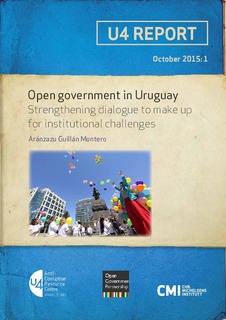| dc.contributor.author | Guillán, Aránzazu | |
| dc.date.accessioned | 2018-01-04T08:21:03Z | |
| dc.date.available | 2018-01-04T08:21:03Z | |
| dc.date.issued | 2015-01-01 | |
| dc.identifier | oai:www.cmi.no:5727 | |
| dc.identifier.citation | Bergen: Chr. Michelsen Institute (U4 Report 2015:1) | |
| dc.identifier.uri | http://hdl.handle.net/11250/2475169 | |
| dc.description.abstract | In Uruguay, innovative practices of consultation and dialogue between government and civil society have enlarged the scope of open government reforms. All the actors involved agree on the priority of access to information commitments as part of the action plans. Strong political support, organizational capacities of public institutions, the leading role of the coordinating agency, and the innovative formulation of the second action plan have facilitated the implementation of reforms.
However, the open government commitments have yet failed to articulate an integral transparency policy that addresses the constraints of the existing access to information law. These limitations result from the complex institutional framework of transparency in Uruguay, resource constraints, and the limits of civil society to engage with the government in a balanced partnership. | |
| dc.language.iso | eng | |
| dc.relation | U4 Report | |
| dc.relation | 2015:1 | |
| dc.relation.ispartof | U4 Report | |
| dc.relation.ispartofseries | U4 Report 2015:1 | |
| dc.relation.uri | https://www.cmi.no/publications/5727-open-government-in-uruguay | |
| dc.title | Open government in Uruguay: Strengthening dialogue to make up for institutional challenges | |
| dc.type | Research report | |
